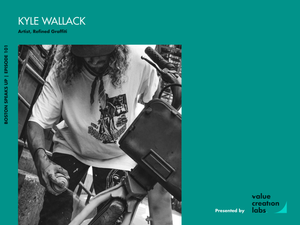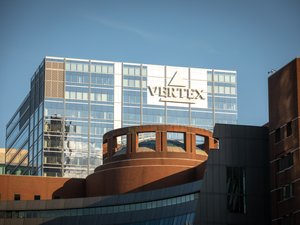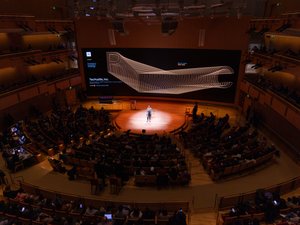The City of Boston's permitting process is complicated and clunky, reliant on an antiquated system developed under a regime not nearly as tech-savvy as Mayor Marty Walsh has proven he can be. If Boston's inaugural civic hackathon, dubbed HubHacks, was any indication, however, residents will soon be shifting into a more accessible, digital age.
The event was held Saturday and Sunday at Boston's "new home for innovation," District Hall. More than 75 individuals, representing a wide range of professionals, from hackers and developers to advisors and City staff, were in and out of the doors throughout the weekend.
"I think it was very supportive," said Adrian Wong, describing the environment. Wong, an aspiring food entrepreneur who's exploring the idea of opening a new burger concept, has been looking to better understand the permitting process himself. "[Attendees] were motivated to make it better so that other people don't have to go through what they went through."
HubHacks presented participants with four challenges at the crux of the City's current permitting pain points: Which permits do I need? What's my address of record? Can I apply for that permit online? Where am I in the approval process?
Teams took to trying to solve those issues, with the help of the Department of Innovation and Technology and the Mayor's Office of New Urban Mechanics.
"It's not just the business owners that are frustrated by the process," Wong said. "The new administration, from what I can see, [is] fully on board with trying to make this as easy as possible from both ends."
Business owners and organizations file thousands of applications for more than 40 different permits city-wide, whether digital dog licensing or bar and restaurant liquor licenses. The process is unwieldy, however, and it is one Walsh has said publicly he would like to change.
"I have made a strong commitment to ensuring a smooth process for anyone in need of permits, from the biggest business seeking an entertainment license, to the individual residents hoping to add a porch to their property,” said Walsh in a statement announcing HubHacks.
To make the process even easier, Walsh signed an executive order in April that open sourced municipal data. Wong said participants started by trying to figure out how to plug those data sources into their code, and suggested the City of Boston consider creating a software development kit for all that newly-released data.
Despite having to navigate around all the information, four teams won the attention of HubHacks' judges, who were: Doug Williams, VP of Engineering at RunKeeper; Korinn Koslofsky, owner of Ula Café; Harlan Weber, brigade captain of Code for Boston; and James DiSabatino, owner of Roxy's Grilled Cheese.
Winning the overall "Best in Show" award was Civic Panda, an aesthetically pleasing permit portal that helps business owners and residents discover the permits they need in three easy steps and then track the progress of those permits online. Civic Panda was also named the winner of the first challenge, which was, Which permits do I need?
The winners of the other challenges were as follows:
What's my address of record?
Winner: City of Boston Official Address Search, which, utilizing services provided by the City's Master Address Database, allows users to look up their address with text- or map-based search capabilities.
Can I apply for that permit online?
Winner: Online Street Occupancy, an electronic, Web-based form designed to replace the in-person, manual process that currently involves multiple departments at City Hall.
Where am I in the approval process?
Winner: Permit Me Boston, a website that enables an applicant to find their permit status online, as well as retrieve any necessary contact information.
"We were really pleased with the great products and concepts that came out of the event, and we are going to work to implement them very soon," said Deputy CIO Matthew Mayrl in an emailed statement to BostInno. "Many will be integrated into the full online permitting platform — for which the City is issuing a request for proposal this week — but there are some things we're going to work on immediately that should be available this fall to our constituents."
To HubHacks Coordinator Dave Levy, the event achieved its goals.
"We went in hoping to see a few things," Levy said, "developers networking with each other and using the City's technology, while also creating things that would benefit every Bostonian."
From the looks of the winners, and response from the City, it's clear Bostonian's lives are about to get easier.
"The hacks [teams] created truly will make our city better," Levy added, "so we definitely would call it a success."
Images via City of Boston/DoIT
Editor's note: A previous draft of this piece stated the executive order to open source municipal data was filed by Boston City Councilor Michelle Wu, when actually Walsh put forth the order himself. The article now reflects that change.








